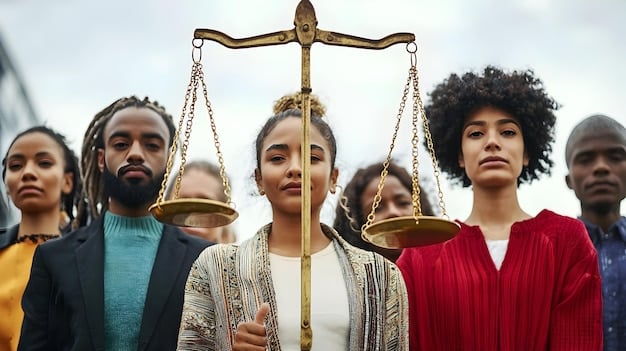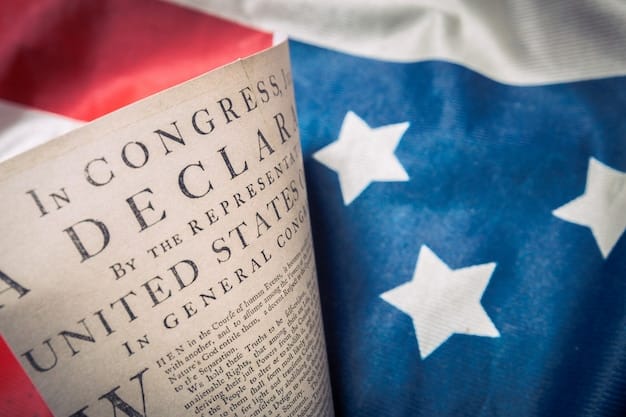How to File a Civil Rights Complaint with the DOJ: A Step-by-Step Guide

Filing a civil rights complaint with the Department of Justice (DOJ) involves understanding your rights, identifying the violation, gathering evidence, and submitting a detailed complaint through the appropriate channels, ensuring your claim is accurately processed and investigated.
Navigating the process of filing a civil rights complaint can seem daunting. This guide provides a clear, step-by-step approach to how to file a civil rights complaint with the Department of Justice, ensuring your voice is heard and your rights are protected.
Understanding Your Civil Rights
Before you begin the process of filing a complaint, it’s crucial to understand exactly what your civil rights are. These rights are protected by federal laws and ensure that all individuals are treated equally under the law, regardless of their race, color, national origin, sex, disability, religion, or familial status.
Knowing your rights empowers you to recognize when they have been violated and take appropriate action.
Key Federal Civil Rights Laws
Several federal laws protect civil rights in various sectors of American life. Some of the most important include:
- Title VI of the Civil Rights Act of 1964: Prohibits discrimination based on race, color, or national origin in programs and activities receiving federal financial assistance.
- Title VII of the Civil Rights Act of 1964: Prohibits employment discrimination based on race, color, religion, sex, or national origin.
- The Americans with Disabilities Act (ADA): Prohibits discrimination based on disability in employment, public services, and accommodations.
- The Fair Housing Act: Prohibits discrimination in the sale, rental, and financing of housing based on race, color, religion, sex, familial status, or national origin.
These laws provide a framework for ensuring equality and fairness across various aspects of society. Understanding which laws apply to your situation is the first step in addressing a civil rights violation.

Understanding your civil rights is essential for protecting yourself and others. By knowing your rights, you can identify potential violations and take the necessary steps to seek justice and ensure fairness for everyone.
Identifying a Civil Rights Violation
Recognizing a civil rights violation is the first crucial step in taking action. A violation occurs when you are treated unfairly or discriminated against based on your protected characteristics, such as race, color, religion, sex, national origin, age, or disability. These violations can manifest in various forms, from overt discrimination to subtle forms of bias.
Understanding what constitutes a violation will help you determine if filing a complaint with the Department of Justice is the appropriate course of action.
Examples of Civil Rights Violations
Civil rights violations can occur in many different settings. Here are some common examples:
- Employment Discrimination: Being denied a job, promotion, or equal pay based on race, gender, religion, or disability.
- Housing Discrimination: Being denied housing or subjected to different terms and conditions based on race, familial status, or national origin.
- Discrimination in Public Accommodations: Being denied access to services or treated differently in places like restaurants, hotels, or stores due to your race, religion, or disability.
- Police Misconduct: Experiencing excessive force, racial profiling, or other forms of abuse by law enforcement officials.
These examples are not exhaustive, but they illustrate the range of discriminatory practices that can constitute a civil rights violation. If you believe you have experienced any of these situations, it’s important to document the details and seek legal advice.
Identifying a civil rights violation requires careful observation and understanding of the laws designed to protect individuals from discrimination. If you believe you have been a victim of such a violation, gathering evidence and seeking guidance from legal professionals is crucial.
Gathering Evidence and Documentation
When filing a civil rights complaint with the Department of Justice, gathering comprehensive evidence is crucial. Solid evidence significantly strengthens your case and increases the likelihood of a thorough investigation. This evidence can take various forms, from eyewitness accounts to documented records and correspondence.
The more information you can provide, the better equipped the DOJ will be to assess the validity of your claim.
Types of Evidence to Collect
Here are some key types of evidence that can support your civil rights complaint:
- Written Records: Emails, letters, memos, and other written communications related to the incident.
- Witness Statements: Signed and dated statements from individuals who witnessed the discriminatory behavior.
- Photographs and Videos: Visual evidence that captures the incident or provides context.
- Official Reports: Police reports, medical records, and other official documents that corroborate your account of the events.
It’s important to organize your evidence in a clear and chronological manner. Keeping a detailed record of events, including dates, times, and locations, can also be invaluable.
Collecting and organizing evidence requires attention to detail and a systematic approach. By gathering as much relevant documentation as possible, you can build a strong foundation for your civil rights complaint and improve your chances of a favorable outcome.
Preparing Your Civil Rights Complaint
Preparing your complaint is a critical step in ensuring it is taken seriously. A well-prepared complaint should clearly outline the facts, identify the specific civil rights that were violated, and provide supporting documentation.
Clarity, accuracy, and thoroughness are key to presenting a compelling case to the Department of Justice.
Essential Elements of a Civil Rights Complaint
When preparing your complaint, be sure to include the following elements:
- Your Contact Information: Full name, address, phone number, and email address.
- Description of the Incident: A detailed account of what happened, including dates, times, and locations.
- Identification of the Perpetrator: Name, title, and contact information of the individual or entity responsible for the violation.
- Civil Rights Violated: Specify the federal laws or constitutional rights that were violated.
- Supporting Evidence: Attach all relevant documents, photos, and witness statements.
In your description of the incident, be as specific as possible. Provide a clear timeline of events and explain how the discriminatory behavior affected you. Include any relevant background information that may provide context to your claim.

Preparing your civil rights complaint requires careful attention to detail and a comprehensive understanding of the facts. By including all essential elements and presenting your case in a clear and organized manner, you can increase the likelihood of a successful investigation and resolution.
Submitting Your Complaint to the DOJ
After preparing your complaint, the next step is submitting it to the Department of Justice. The DOJ has specific procedures for filing civil rights complaints, and it’s important to follow these guidelines to ensure your complaint is properly reviewed.
Knowing the correct channels and processes can streamline the submission and review of your case.
How to Submit Your Complaint
There are several ways to submit your civil rights complaint to the DOJ:
- By Mail: Send your written complaint and all supporting documentation to the appropriate division or office within the DOJ.
- Online: Some divisions of the DOJ allow you to submit complaints electronically through their websites.
- By Phone: In certain cases, you may be able to file a complaint over the phone, although written documentation is generally preferred.
When submitting your complaint, be sure to keep a copy for your records. Include a cover letter that summarizes your claim and lists all the documents you are submitting. Also, ensure that your complaint is addressed to the appropriate division within the DOJ that handles the specific type of civil rights violation you are reporting.
Submitting your complaint requires careful attention to the DOJ’s procedures and guidelines. By following these instructions and ensuring that your complaint is complete and well-documented, you can facilitate a smoother review process and increase the likelihood of a thorough investigation.
What Happens After You File?
Once you’ve submitted your civil rights complaint to the DOJ, it’s important to understand what happens next. The DOJ will review your complaint to determine whether it meets the criteria for further investigation. This process can take time, and it’s essential to be patient and prepared for potential delays.
Understanding the timeline and potential outcomes can help manage your expectations and plan your next steps.
The DOJ Investigation Process
The DOJ investigation process typically involves the following steps:
- Initial Review: The DOJ reviews your complaint to determine if it falls within their jurisdiction and whether there is sufficient evidence to warrant further investigation.
- Investigation: If the DOJ decides to investigate, they may interview witnesses, review documents, and gather additional evidence.
- Determination: After the investigation, the DOJ will determine whether a civil rights violation has occurred. If a violation is found, the DOJ may take legal action, such as filing a lawsuit or seeking a settlement.
Throughout this process, the DOJ may contact you for additional information or clarification. It’s important to respond promptly to these requests and to keep the DOJ informed of any changes in your contact information.
Understanding the DOJ’s investigation process can help you stay informed and prepared as your complaint moves forward. Patience and consistent communication with the investigating agency are key during this time.
| Key Point | Brief Description |
|---|---|
| ⚖️ Know Your Rights | Understand the civil rights laws that protect you from discrimination. |
| 📝 Gather Evidence | Collect relevant documents, witness statements, and visual records to support your claim. |
| ✍️ Prepare Complaint | Outline the incident, identify the civil rights violated, and provide supporting materials clearly. |
| 📧 Submit to DOJ | Follow DOJ’s procedures to submit your complaint, keeping a copy for your records. |
Frequently Asked Questions
▼
Civil rights laws protect against discrimination based on race, color, national origin, sex, disability, religion, and familial status. These laws cover various areas, including employment, housing, education, and public accommodations.
▼
The time frame to file a civil rights complaint varies depending on the specific law and the jurisdiction. It’s crucial to consult with legal counsel or the relevant agency to determine the applicable statute of limitations.
▼
While some agencies may accept anonymous complaints, providing your contact information allows the agency to investigate thoroughly and request additional information if needed, potentially strengthening your case.
▼
If the DOJ finds a civil rights violation, they may take legal action, such as filing a lawsuit, seeking a settlement, or issuing a consent decree. The goal is to remedy the discriminatory practices and prevent future violations.
▼
While you are not required to have a lawyer to file a civil rights complaint, consulting with legal counsel can be beneficial. An attorney can help you understand your rights, gather evidence, and navigate the complex legal processes.
Conclusion
Filing a civil rights complaint with the Department of Justice is a significant step towards protecting your rights and ensuring equality and justice for all. By understanding your rights, gathering thorough evidence, and following the proper procedures, you can effectively advocate for yourself and contribute to a fairer society.





